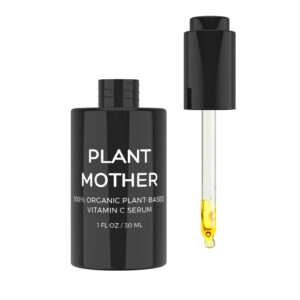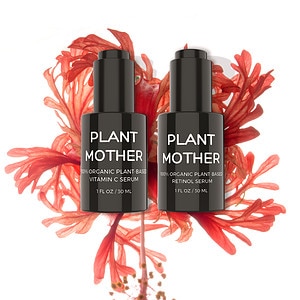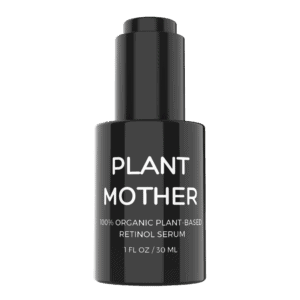Everything You Need To Know About Under Eye Filler
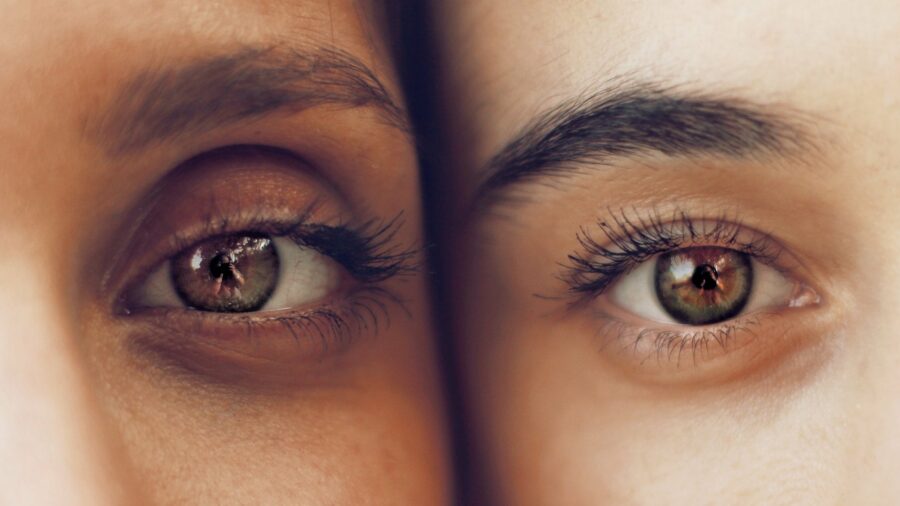
A Full Guide To under eye filler
In this article, we’ll cover everything you need to know about under eye filler – which one’s the best, who needs it and why, what procedures need to be added to it, side effects, and cost. We hope you get all the information you need to make the right decision about this procedure.
Table of Content
- What is an Under Eye Filler?
- Important Things to Take Into Consideration Before Choosing an Under Eye Filler
- Are All Fillers Same?
- Who Needs Under Eye Filler?
- What Do You Need to Know Before Filling Your Under Eye Area?
- Why Many Doctors Don’t do Under Eye Filling?
- Under Eye Filler Additions
- Alternatives to Tear Trough Filler
- Potential Side-Effects of Under Eye Filler
- Which Under Eye Procedure Is Best For You?
- Under Eye Filler Cost
- Under Eye Filler Before And After
- What if You’re Not Happy With The Results?
- Key Takeaways
What is under eye filler?
Under eye filler is usually hyaluronic acid, a gel-like substance. When injected, it acts like a sponge, attracting and absorbing water. In the lower lid, it works over time, attracting more and more water to the injected area to fill up a hollow space under eyes.
Important things to take into consideration before choosing an under eye filler
Under eye filler or tear trough filler rejuvenation is a procedure that is frequently performed in combination with other procedures. Most common ones are CO2 laser skin resurfacing, cheek filler augmentation, and temple filler rejuvenation. The relationship between the lower eyelids and the mid face, along with the smoothness of transition between these two areas of the face, is integral for the best possible under eye rejuvenation with natural-looking results.
For this reason, the ideal rejuvenation of the lower eyelids for many people may necessitate some degree of volume replacement in the lower eyelids, as well as in the mid face with facial filler injections, such as cheek augmentation, to create a smoother transition between the lower eyelids and the mid face tissues. Each facial anatomy is different. Therefore, you should consult with the doctor on what procedure – invasive or non-invasive – would be right for you.
Are all fillers same?
No, not all fillers are good for the under eye area. Juviderm, for example, is too tick to be used in this area. Remember, your skin under the eyes is very thin and sensitive. Therefore, any added substance will be too noticeable if not injected with the right type of filler. Restylane-L is much better for lower eyelids. It has less viscosity and thickness, approximately medium-grade viscosity.

Who Needs under eye filler?
People with pronounced hollowness and sunken eyes would benefit the most from under eye filler. The tear troughs are the depressions between the eye and nose where your tears naturally flow down. Since a tear trough changes with aging, it becomes longer and hollower, often also becoming darker. This happens either as we get older or it can be hereditary. Either way, the way to address the pronounced hollowness in the under-eye area is to do a filler (or lower blepharoplasty).
So here are the main issues that can be addresses with under-eye filler:
- Hollowness and loss of volume below your eyes
- Dark circles and tired sunken eyes
What Do you need to know before filling your under eye area?
- You need to know first if you are a good candidate for under eye filler. It’s best to do a consultation with a doctor to decide if your problem will be solved with fillers. There are some people who have fat bulging under their eyes or under eye puffiness. They wouldn’t solve their issue with fillers. Most of the time they would need fat removal and skin tightening in the under eye area.
- The result you see immediately after filling, is not the real result. It can be misleading. That’s why you need to take with a grain of salt all “before and after” pictures taken right after the filling procedure. Long term results are the only real and accurate results with fillers.
- Another important thing to know is that not all injectors are same! Actually, every injector has their own technique. Make sure you do your research before you choose the injector. Look for before and after pictures and ask as many questions as necessary.
- Fillers only last 6-18 months. At least that’s what most doctors will tell you. In reality though, radiology scans have shown that fillers stay in your face for much longer than that. The good thing is that if you’re not happy with your under-eye fillers, they can be completely dissolved.
Products And Procedures That Go Well With Fillers
As we mentioned before, under eye fillers are often accompanied with other procedures due to a complexity of that part of the face. They often require cheek filler augmentation in order to make the transition from cheeks to under eyes look smooth. Also they require skin tightening around the eyes and crows feet because it’ll look unnatural having fresh and young looking under eyes with pronounced crows feet. So, the whole under eye area has to be treated holistically.
However, it’s not all about cosmetic procedures. Every dermatologist will tell you that you need at least two or three treatments or cosmetic procedures done, but we think less is more when it comes to achieving young looking eyes.
So here are some of the alternative approaches to the fillers or some procedures that go well WITH fillers:
- Eye serum – Of course, you need a good eye serum packed with antioxidants and made specifically for dry, mature, and sensitive under eye skin.
- Retinol and Vitamin C – Plant Mother makes a 100% organic, vegan Retinol Serum. This retinol is made for even the most sensitive skin. It contains antioxidants derived from organic Bakuchiol and over 20 vegan anti-aging botanicals. Bakuchiol is a sacred plant of traditional Chinese medicine, often called “botanical face lift” due to its strong anti-aging properties. For best long-term results, use this Retinol during the night and 100% organic plant-based Vitamin C Serum in the morning. This may significantly delay your need for under eye filler or skin tightening procedures.
- CO2 laser skin resurfacing – often recommended with under eye filler. While fillers fill up the hollow under eye area, CO2 laser removes fine lines and wrinkles around the eyes and crow’s feet area. It also tightens the skin. However, make sure you find a laser specialist, ideally a doctor specialized in laser procedures who has the best lasers available.
A Few More Procedures That Go Well With Fillers
- Crow’s Feet Botox – you can combine under-eye fillers with botox in the crow’s feet area in case you decide not to do CO2 laser skin resurfacing. It is also fine to just do crow’s feet botox without the filler. This will simply “freeze” the muscles responsible for crow’s feet wrinkles. In some cases, you can even improve the look of your eyes by visually lifting them with different eyeliner looks.
- PRP – often recommended with under eye fillers to treat dark circles under eyes. PRP (Platelet-Rich Plasma) is produced by your own body, and when injected into the skin it stimulates collagen and elastin production. It works best when combined with CO2 laser skin resurfacing (or Botox to stop ocular muscles from moving) and under eye fillers. One works to treat dark circles, the other is for fine lines and wrinkles, and fillers for hollowness.
- Cheek Fillers – as we mentioned before, depending on your facial anatomy, you may want to consider adding a little volume to your cheeks in order to smooth out the transition between eyes and cheeks.
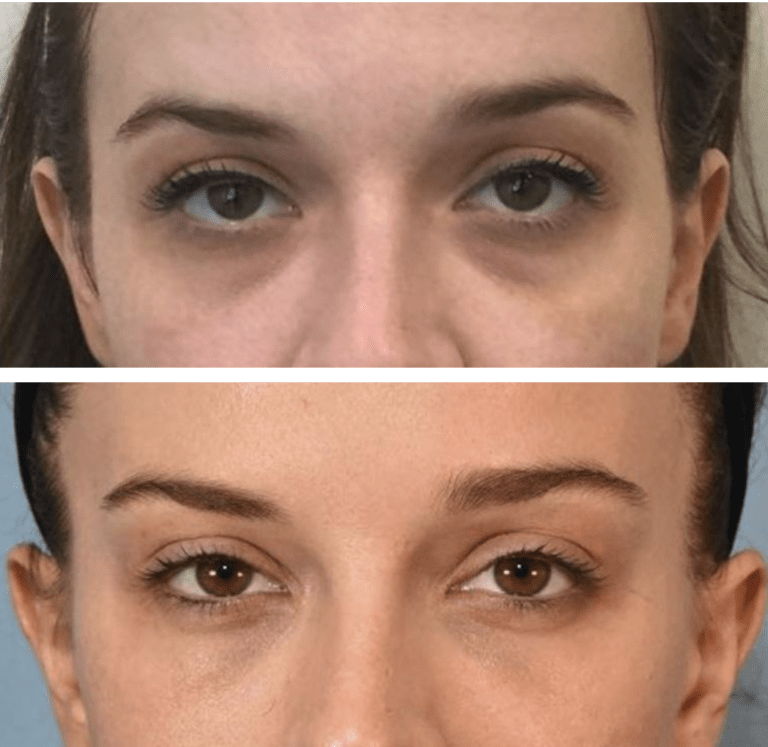
Why Many Doctors Don’t do Under Eye Filling?
Under eye area is one of the most difficult to inject. It’s an unpredictable place to inject because of the fine skin under eyes. This is a very thin and fine skin and any imperfection is visible. Which makes it extremely difficult to achieve optimal results.
Very often the undereye area gets uneven after injecting. Or sometimes both eyes look a little asymmetric due to the difference in under eye filler in both eyes.
Dimples can form underneath the eyes. The main issue is that with fillers, you can’t reach the tear trough ligament to place volume at the perfect place.
Therefore, fillers are an imperfect solution to the under eye hollowness problem. Not that they can’t look good, it’s just that achieving perfect results with fillers is extremely challenging.
Alternatives to tear trough filler
Not everyone is a great candidate for tear trough filler. Some people are unhappy with the results or want a long-term solution without having to rely on fillers. Luckily, those people have alternatives:
- Lower blepharoplasty – In some cases, blepharoplasty surgery combined with fat grafting or CO2 laser will yield the most optimal aesthetic results. Note that this is a surgical procedure. In this case, fat can be repositioned and placed above the tear trough ligament to restore the hollow area and bring back a youthful look. This procedure doesn’t need to be combined with fillers. Actually, it’s a good alternative to fillers.
- Fat Grafting – if you don’t want facial filler injections, you can alternatively do volume replacement in the lower eyelid with facial fat grafting to create a smoother transition between the lower eyelid and the midface tissues. This will help with hollowness and sunken, tired look of your eyes. Fat grafting is usually a part of lower blepharoplasty surgery.
- Plasma Pen – Fibroblast – mostly used for under eye wrinkles and fine lines. Plasma Pen is a cosmetic device that can rejuvenate the skin, tighten sagging skin, and minimize wrinkles. It is particularly effective at improving skin texture and smoothing crepey skin. This non-invasive treatment delivers a micro-electrical charge, which heats the surface layer of the skin.
Potential side-effects of under eye filler
- Injecting too much of the filler can lead to puffiness. Remember, with lower eye lid fillers, less is more. Majority of injectors agree that half of syringe between both under eyes is enough for most clients.
- Bulging can occur if the injector is not skilled, sometimes, even if she/he is skilled.
- Some degree of bruising and swelling can be expected after the procedure, but this will vary based on each individual patient.
- Swelling and puffiness that lasts way longer than 6-18 months, which is a typical lasting time for fillers.
Which under eye procedure is best for you?
The space between the lower eyelid and the upper cheek where tears naturally fall is called the tear trough, and the natural aging process can cause this area to become hollow over time. This creates a sunken appearance, dark circles, puffiness and under-eye bags may be more pronounced. If any of these issues bother you, you’ll have to tackle them separately. Your best bet is to find a doctor (an eye surgeon would be best) and schedule a consultation to figure out the best solution for your specific problem.
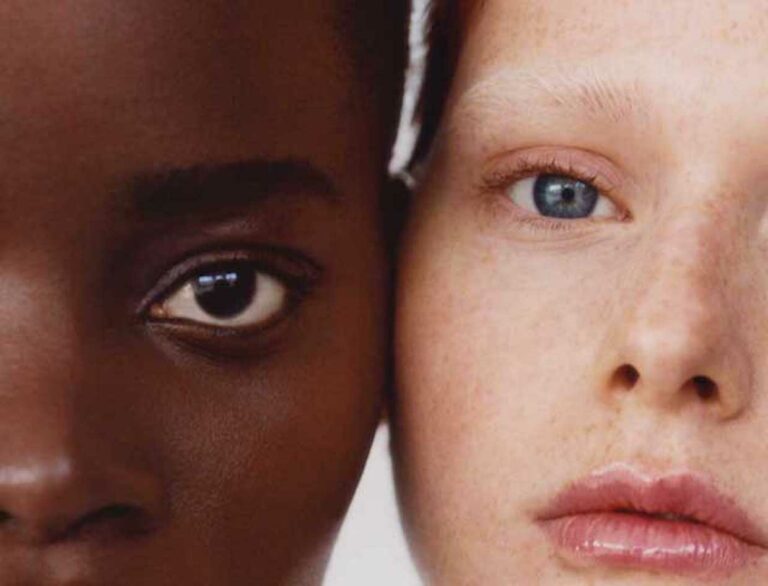
Eye Filler cost
Under eye filler cost varies based on your facial anatomy. Some people will only need fillers, some will need other non-invasive procedures combined with the filler to get optimal results. Where you live also affects the cost of your fillers.
According to the American Society for Aesthetic Plastic Surgery, the total expected cost for fillers like Restylane is about $620 per syringe. Each syringe contains 1 ml of Restylane, which is the amount to be used between both eyes combined. Most people repeat their treatments between 4 and 12 months. So an annual under eye filler cost can be around $1,250, depending on your location it can be even more expensive.
Under Eye Filler Before And After
Here you can see some examples of under eye filler before and after. These images are from centeraesthetic. However we have NO affiliation with this spa and are not endorsing them in any way. The images are serving as an example of under eye filler before and after.
In the first example, the person has dark circles, with hollowness, and fine lines. The second example is showing a person with under eye bags. In both cases end result shows smoothness and rejuvenated look.




What if You’re Not Happy With The Results?
Luckily, you can dissolve fillers if not happy with the results.
Under Eye Fillers - Key Takeaways:
- Due to the tear trough anatomy and the fact that the ligament in this area is tied to the bone, lifting up the under eye with fillers can be challenging. Many doctors question this procedure and think that a lower blepharoplasty (without outside scaring) can be way better way to lift the under eye for people with pronounced hollowness.
- The relationship between the lower eyelids and the midface, along with the smoothness of transition between these two areas of the face, is integral for the best possible under eye rejuvenation with natural-looking results.
- If your problem is not only hollowness in the under eye area, but also dark circles – don’t expect to solve both issues with fillers. Dark circles have to be treated separately.
- Don’t rely solely on under eye filler – you have to have a long-term anti-aging skincare routine plan in place. This should involve a good eye serum, nightly use of plant-based Retinol, and daily use of Vitamin C Serum.
- Remember, as with any part of your face, when it comes to young looking under eye area, less is more. For instance, together with lower blepharoplasty, doctors tend to add many other procedures depending on each individual case. A mid-facelift, facial fat transfer, nano fat injections, CO2 laser resurfacing, Morpheus8 RF energy with micro needling, and / or fillers. They all may be suggested by your doctor to give you the best possible result. But are all these procedures necessary? Always be critical and question every procedure before moving forward with it.
- Under eye filler can be pricey, depending on your location, injector, and the amount of filler used. With this specific area, less is more. Most doctors agree that 1ml of filler split between eyes is enough.
- This type of filler, as all other fillers, has potential side effects. Make sure you’re well informed before you agree on any procedure.
- In order to achieve a long-term youthful appearance of your eyes, use Retinol. However, you should avoid harsh, synthetic Retinol that can often cause dry and irritated skin. Plant Mother’s Botanical Retinol serum is a much better solution and it won’t cause peeling or redness.
- Fillers set in overtime and the real results are seen after a few weeks, sometimes even months. What you see right after the procedure is not the real result.
References:
- https://www.americanboardcosmeticsurgery.org/procedure-learning-center/non-surgical/injectable-fillers-guide/
- https://www.fda.gov/consumers/consumer-updates/dermal-filler-dos-and-donts-wrinkles-lips-and-more
- https://www.health.harvard.edu/blog/dermal-fillers-the-good-the-bad-and-the-dangerous-201907152561
- https://theplantmother.com/product/eye-serum/
- https://theplantmother.com/product/organic-plant-based-retinol-serum/
- https://theplantmother.com/product/organic-plant-based-vitamin-c/
- https://theplantmother.com/product/vitamin-c-and-retinol/
Medical Disclaimer
This content is for informational and educational purposes only. It is not intended to provide medical advice or to take the place of such advice or treatment from a personal physician. All readers of this content are advised to consult their doctors or qualified health professionals regarding specific health questions. The publisher of this content does not take responsibility for possible health consequences of any person or persons reading or following the information in this educational content. All viewers of this content, especially those taking prescription or over-the-counter medications, should consult their physicians before beginning any nutrition, supplement, skincare product, or lifestyle program.


